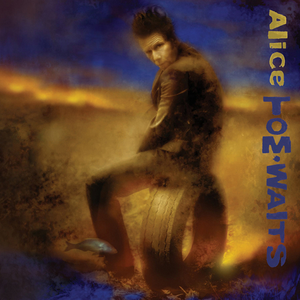Published on May 18, 2005
This album is beautiful, and restrained, and brilliantly
executed. It is a masterwork of melodies that are haunting, dark,
self-consciously perverse and above all else, moving. Ostensibly it
is about the love between Charles Dodgson, aka Lewis Carroll, and
Alice Liddell. But really, the emotions is conveys and the feelings
it evokes are universal. The musical accompaniment to Tom Waits’
crooning here is without guitars; he only uses saxophones, violins,
and other “soft” instruments. On first listen, I was disappointed
in that — I felt he was restraining himself, but then I realized
that it fits the mood and creates the appropriate, almost darkly
Victorian atmosphere.
The opening track is the hook, the beauty that draws you in.
It’s a story of deep and misguided obsession, told with just light
piano and saxophone accompaniment. “And I must be insane / To go
skating on your name / And by tracing it twice / I fell through the
ice / Of Alice.” Waits restrains his voice, coming across more
mournful than usual.
The album begins to explore the madness of obsession further,
with “Everything You Can Think,” dark and haunting. The standard
Tom Waits delivery returns here, sort of that mucusy-spitting
sound, but it works with the lyrics quite well.
The beauty just continues; “Flower’s Grave” and “No One Knows
I’m Gone” are both tragic and haunting, speaking of loneliness and
desperation. The instruments shine brightly here; the echoing
melody tapped out on piano in “Flower’s Grave” is perfect —
restrained and melodic, feeling slow and deliberate, much like the
lyrics.
“Kommienezuspadt” is the closest thing this album gets to an
outright rocker. The grinding, clanking in the background, the
german words, the delivery — it all adds up to a grinding, violent
sounding track that completely distracts from the fact that it
appears to be delivered by none other than the White Rabbit
himself. “And I can’t be late!” It’s either a very strong track or
an annoyance; I’ve come to appreciate it because it builds very
well, adding layers and saxophone punctuations and ultimately
descends into theme of madness that appears throughout the
album.
“Table Top Joe” is a weak track. Tom Waits has been described as
“all character, no substance” and that certainly applies here. It’s
not dreadful, but it’s not an every-time track, either. It may just
be my inability to see the meaning, but the track feels out of
place here, particularly following the exquisitely beautiful
tragedy “Poor Edward.”
“Watch Her Disappear” is staggering in its intensity; the
imagery, the obsession, the need, the loneliness. It’s not quite a
spoken-word track, and it’s not quite musical, but it works on so
many levels. It’s a short glimpse into the mind of a desperately
obsessed man, and it sends chills down my spine.
The rest of the album is exquisite; “I’m Still Here” is
heart-wrenching, better than any similarly themed song from
Chicago. The last three songs on the album may be the most
beautiful music Tom Waits has ever produced — “Fish & Bird” is
a beautiful fable of impossible love. The music all comes together
here, providing four minutes of perfect beauty, of stark futility
but poignant and impressive passion “Barcarolle” is the perfect
expression of depression, acceptance of the impossibility, the
hopelessness of the obsession that tortures our narrator. “And the
children are all gone into town / To get candy and we are alone in
the house here / And your eyes fall down on me.”
This album is possibly the most beautiful Tom Waits has ever
done; it may not be his best, because he certainly constrained
himself musically here, but it is his most passionate and moving
and tragic — his starkest expression of passion and despair.
